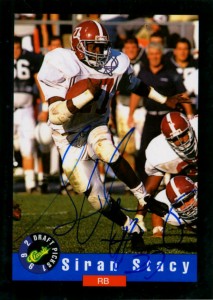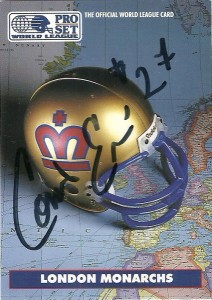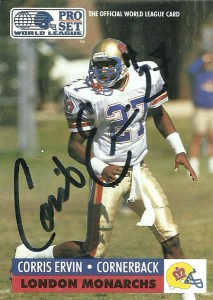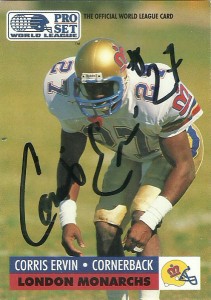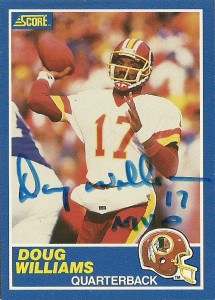 Card: Score 1989
Card: Score 1989
Acquired: Trade 2013
Failure: TTM 2010, C/o The Buccaneers
One of the first Super Bowls I vividly remember watching was Super Bowl XXII between the Denver Broncos and the Washington Redskins. After spotting John Elway and the Broncos 10 points, Doug Williams came onto the field and guided the Redskins to 42 unanswered points. It was the first time a black quarterback had started in the Super Bowl, -and people were making a big deal about it, but as a kid this didn’t really seem to be the biggest storyline. The best thing to me about the game was Williams’ receivers, Clark, Monk, and Sanders who had really great celebrations. I wasn’t really aware of what Williams had been through to that point to get him to the Super Bowl, little less win and become its MVP. Really it’s pretty legendary.
Well, Doug Williams’ career started way, way back in 1978 when he was drafted out of Grambling State by the Tampa Bay Buccaneers, where he was under the tutelage of offensive coordinator Joe Gibbs for that one season. Although his numbers were pretty atrocious, especially his completion percentage early on, Doug showed marked improvement every season from 37.6 in 1978, to 53.2 in 1982. As the team progressed into the playoffs for the first two times in the team’s history, Williams got embroiled in a contract dispute with owner Hugh Culverhouse after the 1982 season. Unable to reach terms with the Bucs, Doug bolted for the upstart USFL in 1983. Some would say that the Buccaneers were cursed after Williams left, as they slipped into the doldrums of the NFC Central where they’d languish for nearly 15 years going through a revolving door of quarterbacks (13) that included names such as Steve DeBerg, Vinny Testaverde, Craig Erickson, Chris Chandler, Steve Young, and Trent Dilfer, before they got it right and then later won the Super Bowl in 2001. (Note that both Young and Dilfer also won the Super Bowl after leaving Tampa, and Young was also MVP. Ironically Chandler and DeBerg showed up on the same team but did not win for the Falcons.)
Doug was selected by the Oklahoma Outlaws. He then moved on to play for Arizona when it merged with Oklahoma as the USFL began imploding the next season. The team didn’t make the playoffs either season, and Williams’ penchant for being an inconsistent passer began to take hold in the media once again. He finished his career in the USFL and it appeared that Williams career was at a standstill as a starter, but an old friend had a roster spot for him on the Washington Redskins- Joe Gibbs.
With Joe Theismann’s career winding down in Washington, the Redskins needed new blood behind Jay Schroeder at quarterback. Familiar with Doug all the way back from his brief stay in Tampa, Gibbs nabbed Williams off the street in 1986. While Doug didn’t really see any playing time that season, it’d be in 1987 that he’d cement his legacy as a historical quarterback of the modern era. Taking over for the injured Schroeder that season, Williams commanded the team and the offense with 11 touchdowns to only 5 picks. He’d also set a then NFL record with the most yards passing in the Redskins’ Super Bowl victory over the Broncos, a game that he won MVP honors for. With Schroeder leaving the Redskins the following season for the Raiders, Doug took over as uncontested starter for the Redskins, but unfortunately Doug could not stay injury free. Instead, he became backup to the next quarterback to win a Super Bowl for the Redskins, Mark Rypien. He retired after the 1989 season, due to lingering back issues. Despite his limited playing time for the Redskins, and 5-9 starting record, Doug is considered legendary by many of the Washington faithful. He was inducted into the Washington Redskins Ring of Fame, and was named one of the team’s 80 greatest players.
Williams jumped into coaching and front office roles with equal vigor, enjoying stops at the US Naval Academy (1994), Scottish Claymores (1995), Jacksonville Jaguars (1995-1996), Morehouse College (1997), Grambling (1998-2003), Tampa Bay Buccaneers (2004-2010), Virginia Destroyers (2010-2011), and then returned to become head coach at Grambling where he has remained through 2012. It’s very easy to say that Williams legacy as the first black starting quarterback in the modern era cemented leadership roles for future players such as Warren Moon and Randall Cunningham and on into the modern era of quarterbacks today.
G/Gs 88/81 Att 2501 Comp 1240 Yds 16998 Pct 49.5 Td 100 Int 93 Rat 69.4 |
Rush 220 Yds 884 Avg 4.0 Td 15 Lg 29
